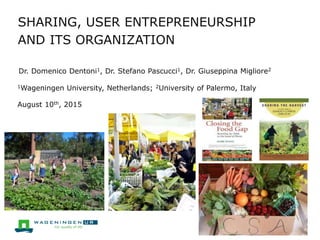
Sharing, User Entrepreneurship and Its Organization
- 1. SHARING, USER ENTREPRENEURSHIP AND ITS ORGANIZATION 1Wageningen University, Netherlands; 2University of Palermo, Italy August 10th, 2015 Dr. Domenico Dentoni1, Dr. Stefano Pascucci1, Dr. Giuseppina Migliore2
- 2. Sharing and its “frugal dimension” 2 Sharing economy… Ex.: Airbnb; Uber; Linux. Joint ownership OR joint access to goods & services …And its “frugal dimension”: Prosumption Social production Commons-based peer production Community-based peer production “Growing your food is like printing your own money” (Finley, guerrilla gardener in South LA, 2013, TED talk) Nature of shared goods/servi ces Non- exclusive Exclusive Non-Rival Public Goods Club Goods Rival Commercial Sharing Private Good Sharing Lamberton & Rose (2012)
- 3. Two broad research questions 3 1.How does sharing consumers’ behavior contribute to value creation in their organizations? 2.How do organizations stimulate their sharing consumers to contribute to value creation? Social and/or economic value creation in sharing organizations Consumer = participant behavior in sharing organizations Organizational mechanisms of sharing 12 Implications
- 4. Inductive method: cases, samples, data 4 DATA THEORY Participation & interviews on sharing consumers’ behavior from 7 cases of “Solidarity purchasing groups” (SPGs), Italy (2010-2013) Sharing (Belk 2010; Lamberson & Rose 2012) and its “frugal dimension”. Replication of interviews from similar 16 cases in Spain (grupos de consumo and community gardens) and 9 similar cases in Netherlands (Comm. Supported Agriculture) (2013-2014). Secondary data and follow up interviews on organizational mechanisms and consumers’ behaviors across cases (2013- 2014). Entrepreneurship and entrepreneurial behaviors (Shane 2010; Bird et al. 2012); bricolage. Organizational mechanisms governing the sharing processes (Grandori and Furnari 2008; Grandori and Prencipe 2013) • Data-theory iteration • Purposive case/sample selection (Eisenhardt 1989; Suddaby 2006; Yin 2014).
- 5. Findings (I): User Entrepreneurship User Entrepreneurship (or Entr. In Consumption): The process of innovatively recombining resources to seek or create opportunities that generate user (rather than exchange) value. . 5 Participants pursue novel opportunities for value creation Definition takes into account: entrepreneurship (Shane 2010); in everyday life context (Steyaert and Hjorth 2004); accidental entrepreneurship (Shah and Tripsas 2007); user value in management (Bowman & Ambrosini 2000; Priem 2007) Participants recombine resources through sharing them with others WHAT participants do: Procure food Organize storage & distribution Organize finance Organize knowledge sharing, leisure events Seek new members or promoting this form of consumption HOW participants do: Use and recombine time & labor Use and recombine social capital Use and recombine financial capital Use and recombine physical capital
- 6. (II): Organizational mechanisms of sharing 6 Relationships take into account: Grandori and Prencipe (2008); Grandori and Furnari (2013) Prevalence of… Sharing of decision/represe ntation rights: - Co-decision on food & inputs - Co-access to resources Sharing of ownership rights: - Residual claimants - Transfer rights - Exclusion rights Market-Like elements Bureaucratic elements Communitarian elements CSA Netherlands; some SPGs in Italy Some Spanish grupos de consumo SPGs; Spanish community gardens Distinctive practices: - Must pool money - Pay per food production & distribution unit Distinctive practices: - Must pool time - Formal governance - Formal division of tasks Distinctive practices: - Must pool knowledge & values - Informal governance - Informal division of tasks
- 7. (II): Organizational mechanisms of sharing 7 Relationships take into account: Grandori and Prencipe (2008); Grandori and Furnari (2013) Prevalence of… Sharing of decision/represe ntation rights Sharing of ownership rights Market-Like elements Vertical Leadership Vertical Leadership Bureaucratic elements Shared Leadership Shared Leadership Communitarian elements Creativity Creativity CSA Netherlands; some SPGs in Italy Some Spanish grupos de consumo SPGs; Spanish community gardens Distinctive practices: - Must pool money - Pay per food production & distribution unit Distinctive practices: - Must pool time - Formal governance - Formal division of tasks Distinctive practices: - Must pool knowledge & values - Informal governance - Informal division of tasks Vertical/Shared leadership and creativity are different forms of entrepreneurial behavior (Bird et al. 2012)
- 8. (II): Organizational mechanisms of sharing 8 Relationships take into account: Grandori and Prencipe (2008); Grandori and Furnari (2013) Prevalence of… Sharing of decision/represe ntation rights Sharing of ownership rights Market-Like elements Vertical Leadership recombining resources within the organization Vertical Leadership recombining resource outside organization Bureaucratic elements Shared Leadership recombining resources within the organization Shared Leadership recombining resource outside the organization Communitarian elements Creativity recombining resources within the organization Creativity recombining resource outside the organization CSA Netherlands; some SPGs in Italy Some Spanish grupos de consumo SPGs; Spanish community gardens Distinctive practices: - Must pool money - Pay per food production & distribution unit Distinctive practices: - Must pool time - Formal governance - Formal division of tasks Distinctive practices: - Must pool knowledge & values - Informal governance - Informal division of tasks Vertical/Shared leadership and creativity are different forms of entrepreneurial behavior (Bird et al. 2012)
- 9. Propositions and… “so what?” 9 ! ! ! ENTREPRENEURSHIP* IN*CONSUMPTION* SHARING* Prevalence!of! Market/Like! Elements! Prevalence!of! Bureaucratic! Elements! Prevalence!of! Communitarian! Elements! Vertical!Leadership! Shared!Leadership! Creativity! P1**+* P3**+* P2**+* P4**+* P5**+* P6**+* Distribution!of! Decision!Rights! Distribution!of! Ownership!Rights! Networking! Organizing! Social and/or economic value creation Implications
- 10. Final points & discussion 10 1. “Sharing” as co-access and/or co-ownership: Wide variety of forms, contexts and vocabulary This paper aims to understand how individual participants contribute to “frugal forms” of sharing 2. Entrepreneurship in consumption plays key role in sharing: Entrepreneurship -> Sharing Performance? Or sharing -> entrepreneurship? Can entrepreneurship be “user value-based”? Is it useful for consumers’ quality of life? Can it be learned? Can this learning be applied outside the sharing economy? 3. Organizational mechanisms help explaining what sharing really entails: How do they change participants’ behavior through feedback mechanisms of value creation?
- 11. Thank you! This is still a working paper: your feedback is tremendously appreciated! 11 Dr. Domenico Dentoni - domenico.dentoni@wur.nl Dr. Stefano Pascucci and Dr. Giuseppina Migliore